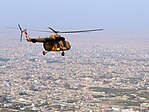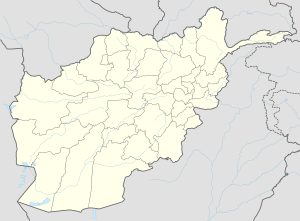Mazar e Sharif
| Mazar-i-Sharif | ||||||
|---|---|---|---|---|---|---|
From top left to right: Afghan Air Force helicopter flies over Mazar-i-Sharif; Blue Mosque; View from Maulana Jalaludin Cultural Park; Industrial area.
|
||||||
| Location in Afghanistan | ||||||
| Coordinates: 36°42′N 67°07′E / 36.700°N 67.117°ECoordinates: 36°42′N 67°07′E / 36.700°N 67.117°E | ||||||
| Country |
|
|||||
| Province | Balkh Province | |||||
| District | Mazar-e Sharif District | |||||
| Government | ||||||
| • Mayor | Nasir Ahmad Aini | |||||
| Elevation | 357 m (1,171 ft) | |||||
| Population (2015) | ||||||
| • Total | 577,500 - 693,000 | |||||
| Time zone | Afghanistan Standard Time (UTC+4:30) | |||||
Mazar-i-Sharif or Mazar-e-Sharif (Persian/Pashto: مزارِ شریف, ˌmæˈzɒːr ˌi ʃæˈriːf) is the third-largest city of Afghanistan, with a 2015 UN—Habitat population estimate between 577,500 and 693,000. It is the capital of Balkh province and is linked by highways with Kunduz in the east, Kabul in the southeast, Herat in the west and Uzbekistan in the north. Mazar-e Sharif, along with Herat, Jalalabad in the east and Kandahar in the south, makes Afghanistan an important strategic location in Asia. The city also serves as one of the many tourist attractions because of its famous shrines as well as the Muslim and Hellenistic archeological sites. In 2006, the discovery of new Hellenistic remains was announced.
Mazar-i-Sharif is the Regional Hub located in the northern region in close proximity to Uzbekistan and Tajikistan. Mazar-i-Sharif has the highest percentage of built-up land (91%) of all the Afghani provincial capitals, and it has additional built-up area extending beyond the municipal boundary but forming a part of the larger urban area.
The region around Mazar-e-Sharif has been historically part of Greater Khorasan and was controlled by the Tahirids followed by the Saffarids, Samanids, Ghaznavids, Ghurids, Ilkhanates, Timurids, and Khanate of Bukhara until the mid-18th century when it became part of the Durrani Empire after a friendship treaty was signed between emirs Murad Beg and Ahmad Shah Durrani. The Mazari Sharif Airport in the city has been heavily used during the 1980s Soviet war and the latest 2001-present war.
...
Wikipedia





